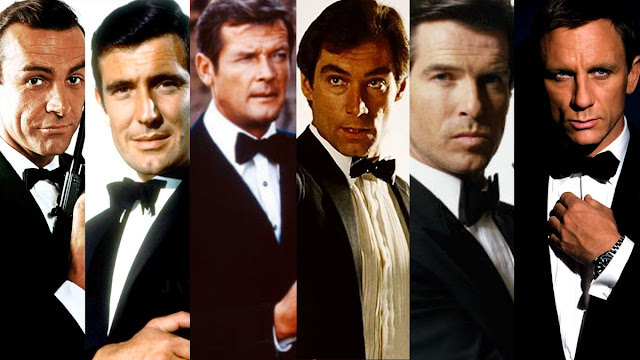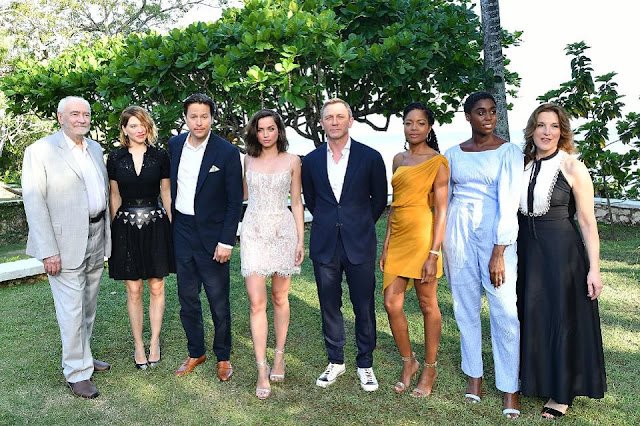Which Film Defined The 007 Franchise?
'Dr No' or 'The Spy Who Loved Me' - which 007 flick most defined the franchise that's ruled the action genre for over 55 years?
 |
| Every actor to play Bond (CREDIT: EON) |
by Jack Linsdell
First on the list is Terence Young's slow-burn spy thriller Dr No. That iconic 1962 movie not only introduced the world to Sean Connery, an unknown but charmingly handsome actor in the day, but kicked off the whole franchise by giving us 007's first big-screen adventure. Of course, because Dr No was the first James Bond film, it's automatically a contender for "film that defined the franchise" if only on the merit that it set the original precedent/template. We get the introduction to Monty Norman's infamous 007 theme, not to mention a first version of the prestigious opening titles, the first delivery of the line "the name's Bond. James Bond" and the very first gunbarrel sequence too. These have become such iconic hallmarks of the series, elements that make a Bond film (especially one released today) different from anything else in the marketplace. They give Bond its identity, and without Dr No, we wouldn't have some of the most defining elements of the franchise. Sure I take the point that it's kinda obvious that the first movie of a series could be seen as defining on the pure nature of it being the "first" one. However, Dr No really did establish the basic formula for a Bond movie, that no matter how much it evolved and changed, would still adhere to the basic principles this original Sean Connery outing set up. We have a glamorous, tropical setting. We have beautiful women in skimpy, sexy clothing. We have a megalomaniac villain with a deformity. Oh, and we have the first car chase. No matter what subsequent movies did (or changed), perhaps Dr No really is the defining Bond flick?
Jump to two years later and we find Guy Hamilton's iconic (but god awful, sorry) Goldfinger. Connery's third outing in the role is mostly seen as when the "real" Bond on the big-screen was established. Not only did we get an introduction to Q (played by Desmond Llewellyn until his final appearance in 1999's The World is Not Enough) but we also established the gadgets (and the scene where Bond visits Q's lab) that would become a defining (and cool) hallmark of the series. We also meet Bond's beloved DB5 for the first time, which would not only go on to become one of the most famous cars in film history, but also introduced us to the car (and brand) which all other 007 iterations (apart from Moore) would go on to drive too. Furthermore, Goldfinger also established the over-the-top villain's plan, not to mention the lighter, campier and fantastical tone that would come to define at least half the movies in the series. It also sees the start of a running joke where Bond Girls were given names with heavy sexual connotations (Pussy Galore), not to forget the introduction to a sidekick with a distinctive killing feature (Odd Job and his decapitating hat). Goldfinger was a big departure from the grounded "real world" approaches of Dr No and From Russia with Love, yet its popularity in the day and enormous box office clearly set a precedent where in the fantastic Bond adventures would play better commercially but appealing the masses, whilst the darker more realistic installments would please die hard fans and critics.
The third contender lies in Roger Moore's third outing as the secret agent in Lewis Gilbert's 1977 Bond flick The Spy Who Loved Me. This action-adventure became the first Bond movie to be released since original series producers Harry Saltzman and Albert R. Broccoli had split and parted ways. MGM bought Saltzman out, leaving Broccoli as the sole producer of the series until his death in 1995. It's no secret that their rather public relationship breakdown had affected the quality of the last three movies (which are some of the franchise's lowest points), so perhaps it's a big reason why The Spy Who Loved Me seems like such a breath of fresh air. We get the first prevelance of a big "can't believe your eyes" stunt in a Bond movie (something that Dalton and Craig would go on to use) with the quite jaw dropping ski jump off the cliff. And, the debonair, charming, dinner jacket-dressed Bond that has become such an iconic and aspirational image for young boys, was really cemented and made "cool" for the first time in Lewis Gilbert's second Bond flick. Not to mention the seamless merging of comedy (without it being to over the top or gag based) with darker action that came to define the latter era of Moore. We also get the introduction to Jaws (arguably the basis for Bond henchman to follow) with his signature metal teeth. Unlike Dr No and Goldfinger, The Spy Who Loved Me bought nothing new to the basic formula of a Bond movie. What it does get credit for is defining the tone for the latter half of the series and making the image of Bond and the feel of a 007 flick explicitly "cool" to a young Male demographic.
Lastly, we have Timothy Dalton's second and final installment as Bond with Licence to Kill. John Glenn's 1989 gritty and violent thriller was widely ignored and panned by audiences and critics at the time for being too "dark" and taking the franchise away from its family-friendly formula. However, despite being one of the best films in the series, audiences just weren't ready for a more hard edged Bond. What Licence to Kill would do is lay the groundwork for Craig when he introduced that much darker portrayal of 007 in Casino Royale that won him so much praise and popularity. Licence to Kill showed Bond as damaged goods, an emotionally compromised and isolated assassin who wasn't afraid to kill. It also introduced a level of violence and brutality (both in its villain and action) where people get hurt and there are consequences. This is something even Brosnan would adopt just six years later in Goldeneye albiet to much better commercial results. Dalton's movie also introduced us to a more real world villain and plan, not to mention the first "strong agent" Bond girl that Brosnan and Craig's era would actively go on to embrace. Although at the time people didn't realise it, Licence to Kill most defienlty defined the way the modern Bond franchise would go and for that it's the unsung hero.
So, what is the movie that defined the Bond franchise? In truth, I don't know. I would probably say The Spy Who Loved Me on the basis that it arguably turned the image of James Bond into the cool, idolised one we know and love today. However, Goldfinger was instrumental in defining the lighter, more fantastical side to the franchise, whilst Licence to Kill did the same for the latter entries that stayed true to the original books. And, there is the argument that Dr No should get the title on the merit that it was the very first one. However, in truth, the Bond franchise has evolved over time with each actor, which really means that every one of the movies has in it's own way defined the franchise we know and love today. Maybe that's the real answer to that fateful question...


Comments
Post a Comment